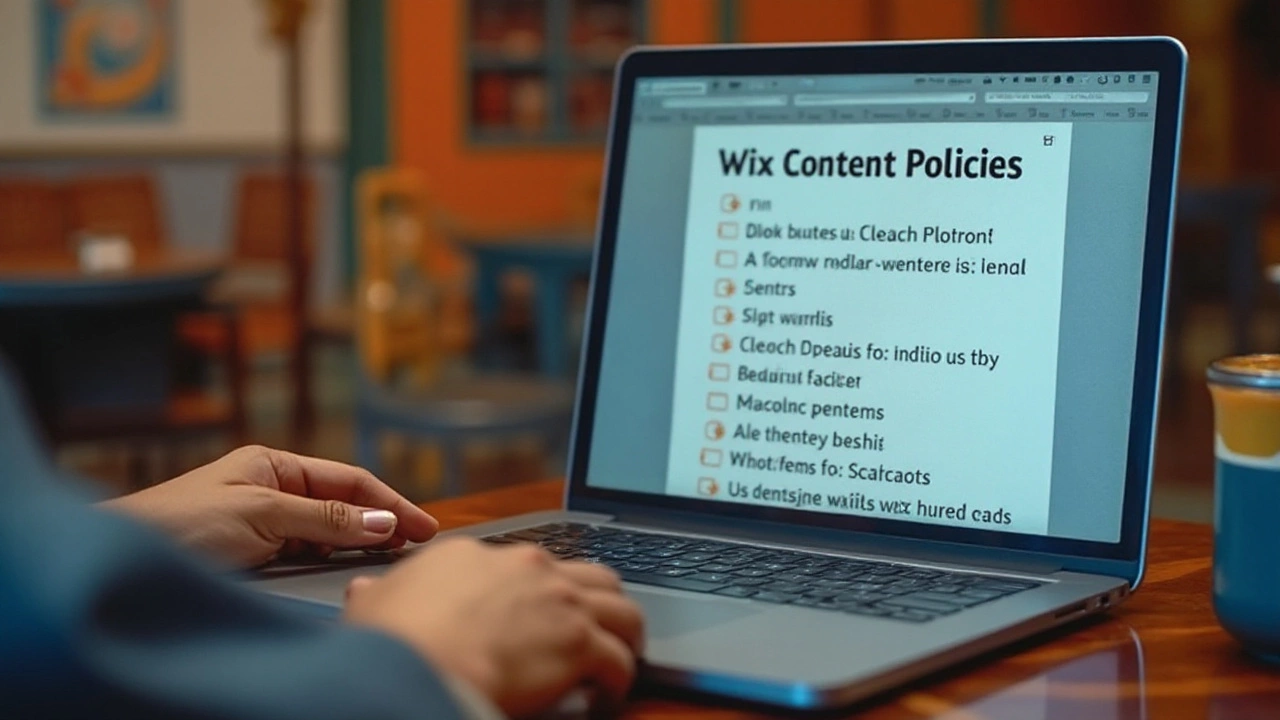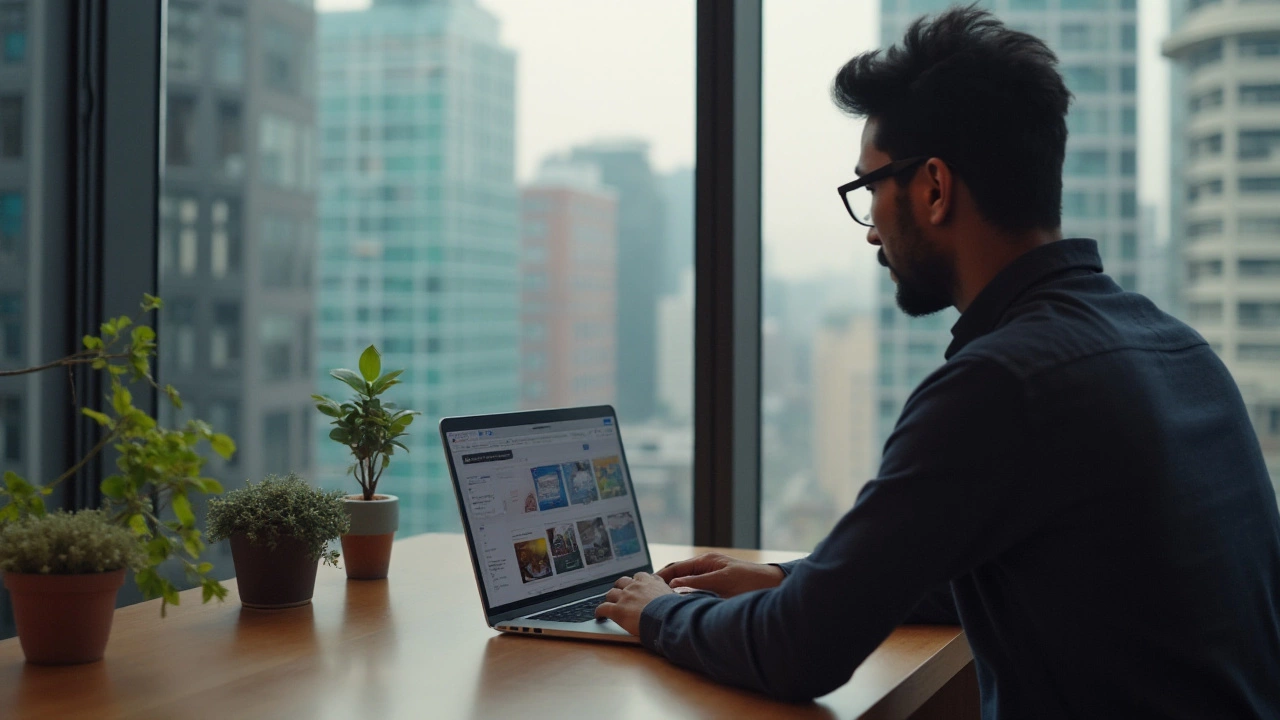In the digital age, creating an online presence has never been easier, thanks to platforms like Wix. This user-friendly website builder opens up a world of creativity for anyone looking to establish their corner of the internet. Yet, with great power comes great responsibility—or in this case, some restrictions.
Wix has established a clear set of guidelines that dictate what can and cannot be published on sites built with their tools. These rules not only safeguard the users but also uphold a safe and respectful environment for visitors. They cover everything from prohibiting illegal activities to ensuring that no misleading content is shared. Let's dive into what kind of content is banned on Wix and how to ensure your site stays on the right side of these rules.
- Introduction to Wix's Content Policy
- Illegal Activities and Content
- Hate Speech and Harassment
- Misleading and Fraudulent Content
- Copyrighted Material Restrictions
- Tips for Staying Compliant
Introduction to Wix's Content Policy
As a platform that empowers millions to craft their own digital spaces, Wix prioritizes the creation of a healthy and respectful online environment. Recognizing its role in both social and commercial spheres, Wix has established a comprehensive set of guidelines known as its content policy. These rules are not merely suggestions but are foundations that maintain the integrity and legality of the content hosted on its sites. At its core, the policy aims to ensure that all published content adheres to legal standards worldwide while fostering a community that is both safe and free from harmful practices.
The essence of the Wix policies is rooted in common sense and mutual respect. Content creators are expected to avoid topics and actions that could be deemed illegal or offensive. This prohibits anything from spam to hate speech, as well as adult content and services which might infringe on the rights and dignity of others. An enlightening observation to consider is how these policies are in line with many other digital platforms, reflecting a universal norm expected of internet users. Moreover, the policies engage with the dynamic nature of the web, reiterating with updates that adapt to new challenges and digital behaviors emerging in the online world.
To ground their policies, Wix has drawn input from various legal precedents and digital ethics frameworks. This approach shows a dedication to evolving in step with international standards and customer needs. In response to the necessity for transparency, Wix openly shares these guidelines on their website, making it accessible for all users, new and old. This openness is key, as it fosters trust and eases the navigation of digital complexities for users managing their personal or business sites. It is not uncommon for users to find themselves questioning whether certain materials are suitable for publication. The Wix restrictions serve as a valuable compass, helping users to steer clear of any gray areas. They even provide a support system, offering resources and guidance to aid users in understanding and implementing the policies effectively.
According to a report by the Digital Trust and Safety Partnership, "Platforms play a crucial role in shaping user interactions and ensuring a trustworthy environment online." This sentiment captures precisely why content policies like those at Wix are indispensable, echoing a commitment to user safety and ethical standards.
It's essential to see the guidelines not as limitations but as parameters that keep the digital landscape vibrant, diverse, and thriving. By abiding by these policies, users contribute to a platform that is conducive to positive growth and development, offering an equitable stage for all voices. This proactive approach not only protects users from legal ramifications but significantly enhances the quality and reliability of content on their sites. By firmly embedding these principles into their platform, Wix continuously works towards minimizing risks associated with harmful content, thus safeguarding user experiences across its myriad of hosted sites.
Illegal Activities and Content
When it comes to maintaining a safe and lawful platform, Wix doesn't cut corners. In their effort to foster a trustworthy environment, they strictly prohibit any content that could be involved with illegal activities. This isn't just about stopping blatant criminal enterprises online, but about maintaining a community where users can feel secure and supported. You might wonder what specific activities fall under this category. On the chopping block are activities promoting or facilitating criminal behavior—think selling counterfeit goods, offering or soliciting illegal services, or organizing schemes that deceive individuals out of their money or data.
If you've ever thought about dabbling in anything that brushes against legal boundaries, you might want to reconsider. One slip-up could mean more than just having your site taken down; it might also involve action from law enforcement agencies. Those involved in fraud, pyramid schemes, or activities promoting violence face this kind of stringent enforcement. Website content rules clearly highlight the importance of legality, and knowingly uploading illegal content could bring severe repercussions—not just a temporary reprimand, but potentially permanent removal from the platform or police involvement.
Understanding the Boundaries
To better grasp what isn’t allowed, it's crucial to consider why these rules exist. Platforms like Wix operate internationally, and what might be considered illegal can vary widely from one region to another. However, the baseline is that anything violating international laws, including trafficking or organized crime, is a non-starter. Threats, exploitation, hate groups or terrorism supporters often see their content swiftly removed. In a world where digital scams are rampant, the need for such policies is as imperative as seatbelts in cars.
Consider also the implications for businesses dependent on legitimate yet borderline areas of operation. With restrictions on Wix, those looking to push boundaries for profit should be acutely aware of what they publish. Sometimes, it helps to turn to reliable sources for guidance.
A representative from the Internet Society once remarked, "The internet must remain a safe place where communities can thrive in harmony, underscoring the importance of responsible online behavior."These pivotal guidelines are thus foundational in protecting not just Wix users, but the broader online community from malign influences.
Impact of Violations
Breaking these rules is no trivial matter. If you're caught engaging in illegal activities on the platform, it's not unlike playing with fire. The best-case scenario might result in a suspended account; the worst could involve a deeper investigation by authorities. Moreover, even inadvertent oversights on matters of legality can position your site in a precarious situation. Addressing violations can be a cumbersome affair; it's a clear reminder of why adhering to policy is imperative.
Utilizing Wix properly involves discerning its legal framework's extent and limits. For those keen on exploring the nitty-gritty details of legality on the internet, there's more information presented in guidelines accessible for users. The takeaway is simple: for a smooth experience on Wix, avoid illegal content like the plague. It's a modern digital dance where leaps into gray zones should be sidestepped entirely, prioritizing transparent and ethical engagement instead. This ensures not just compliance, but also establishes trust between you, your audience, and the Wix platform.

Hate Speech and Harassment
In our diverse digital landscape, ensuring an inclusive and respectful online community is paramount. Platforms like Wix have made it clear that hate speech and harassment have no place in their user-generated content. This policy is crucial in maintaining a positive online experience, not only protecting those who might be targeted but also fostering a safe environment for every user.
Hate speech, by definition, involves language or behavior that disparages individuals or groups based on attributes like race, religion, ethnic origin, sexual orientation, gender identity, disability, or other characteristics. The spread of such speech has far-reaching negative impacts, often perpetuating discrimination and societal division. Harassment includes repeated or persistent unwanted behavior that aims to distress or threaten an individual. Wix actively monitors and takes necessary actions against content that falls under these categories, ensuring users understand that their platform is for creative expression and not for spreading hate.
According to a Pew Research report, approximately four-in-ten Americans have personally experienced online harassment, with around 66% witnessing behavior that fits this description in the digital realm. Such statistics underscore the importance of strict policies preventing hate speech and harassment. They highlight the detrimental effects these actions can have on individuals and the community at large. It's not just a matter of compliance with a platform's rules; it’s about promoting a culture of respect and understanding.
"Free speech is meant to protect civil, not uncivil, discourse. Online platforms have a duty to curtail harmful expressions that undermine the basic dignity of all." - Tim Bale, Professor of Politics
Wix, aware of the potential misuse of its platform, also provides tools and guidelines to help users navigate these waters. When users design their websites, the power of community guidelines is reinforced through prompts and flags that remind them of the standards that govern the platform. This proactive approach helps deter inappropriate or harmful content before it is published. By doing so, Wix not only protects its reputation but also contributes to a global effort towards respectful and constructive community interaction.
For those managing their own Wix sites, a key strategy to prevent encountering issues with hate speech is to familiarize themselves with the platform's terms of service and actively moderate user-generated content. Implementing filters and monitoring comments can significantly reduce the risk of unwanted interactions. Moreover, creating a clear policy for user engagement on your site can set a standard for acceptable behavior, thereby discouraging any potential misconduct.
Platforms like Wix demonstrate that striking a balance between creative freedom and responsible use of that freedom is essential. The restrictions put in place are not to stifle creativity, but to safeguard it by ensuring everyone has the opportunity to contribute positively and without fear of discrimination or intimidation. By understanding and supporting these rules, users can continue to create vibrant and inclusive digital spaces.
Misleading and Fraudulent Content
Creating a website on Wix requires you to adhere to guidelines that are crafted to keep the platform a legitimate space for information and commerce. One critical area of concern that the platform addresses rigorously is misleading and fraudulent content. This type of content not only undermines the trust of your visitors but also jeopardizes the integrity of the entire Wix community. Misleading content can cover anything from exaggerated claims about products to deceitful practices designed to manipulate users into making unfavorable decisions. Understanding what constitutes as misleading is vital so you can ensure your site remains credible and trustworthy.
Wix takes a firm stance against fraudulent actions. These are not just limited to misrepresentations on ecommerce sites but extend to areas such as the misuse of personal data or the promotion of pyramid schemes and investment frauds. An example would be promising fantastic financial returns with unrealistic guarantees or offering products that claim impossible results. Authorities and platforms alike recognize the importance of combating such fraudulent behavior online. As an article by the Australian Competition and Consumer Commission suggests, maintaining honesty in digital offers is crucial not only for legal compliance but also for customer relations. "Transparency is the key to a successful online operation," the ACCC states, highlighting the importance of clear and truthful communication.
Another layer to this involves safeguarding your visitors against phishing attempts. Websites that mimic banking or financial institutions to extract personal information are strictly prohibited. Ensuring that no harmful software is embedded that could mislead a user is fundamental. This includes spoof websites and services that use similar design elements to established firms to trick the public. As a proud Wix user, your responsibility extends beyond the aesthetic design; it involves a commitment to ethical digital practices. If you ever doubt the information being shared, a good rule of thumb is to verify through reputable sources and never publish until certain.
In an effort to maintain transparency in online advertising, the platform also regulates the kind of advertisements you can run on your site. Any ad material that may misrepresent a product's nature, endorse unsafe practices, or present a biased view is scrutinized and potentially removed. This reflects a broader trend across the internet where the emphasis is on consumer protection and trust. The straightforward truth is: when your content is truthful, your visitor's engagement is genuine, leading to sustainable growth and loyalty. Therefore, aligning your site with these content policies is not only about keeping in line with Wix restrictions, but it's also about preserving a reputable online identity.

Copyrighted Material Restrictions
When it comes to creating content on platforms like Wix, understanding copyright laws is vital to avoid the pitfalls of unintentionally breaching intellectual property rights. These laws are designed to protect the original creators, ensuring they receive due acknowledgment and compensation for their work. To put it plainly, incorporating media that you don't own or lack explicit permission to use can land you in hot water, both legally and with the platform itself.
Certainly, it might be tempting to decorate your site with captivating images or audio clips found online. But doing so without the proper clearance could result in your site being suspended or, even worse, attract legal action from the original content owners. A pivotal aspect of staying compliant is ensuring that you possess the rights or have secured licenses for any copyrighted material you wish to display or use. Platforms such as Wix often emphasize the significance of respecting these laws since failing to do so could jeopardize the integrity of their service.
Respecting copyright doesn't just mean understanding the law—it's about adopting best practices that ensure your content remains credible and legitimate. One common route is sourcing media from royalty-free repositories or using original content. These steps can efficiently safeguard you from legal entanglements. In addition, using Creative Commons-licensed content that allows commercial use can be a practical alternative, assuming proper attribution is made where required. To illustrate, services that house such resources are often a good starting place for finding suitable and legal media for your site.
Moreover, consider hosting user-generated content? It's essential to have processes in place to swiftly address any infringement claims. This often involves clear takedown procedures and user agreements that hold contributors accountable for their submissions. By implementing these measures, not only do you protect your site from copyright violations but you also cultivate a culture that respects creators' rights.
"Respect for copyright laws is integral to maintaining the integrity and creative diversity of the digital sphere," notes Andrew Gowers, author of the renowned Gowers Review of Intellectual Property. "Navigating these laws might seem daunting, but it is fundamentally about fairness to creative individuals and businesses alike."
With companies becoming more vigilant about copyright violations, Wix is committed to ensuring that all users understand the critical nature of adhering to these restrictions. Remember, ignorance of the law isn't an excuse; rather, creating a culture of understanding and respect around copyright can significantly enhance the overall trust and professionalism projected by your website.
Tips for Staying Compliant
Navigating the waters of building a website with Wix requires a keen eye on compliance, especially considering their set content guidelines. Staying compliant doesn't just protect your site from removal; it also builds trust and credibility with your audience. To kick things off, understanding and regularly reviewing Wix's terms of service is crucial. This detailed document outlines everything you need to know about their website content rules and the kinds of activities deemed inappropriate or restricted. It might sound tedious, but having a firm grasp of these terms can prevent future headaches.
One critical area to watch is ensuring that your site does not engage in or promote illegal activities. Though it seems obvious, many users accidentally fall into this trap by unknowingly sharing content or links to illegal downloads or products. Keep your materials transparent and legal. Thoroughly vet any third-party software, plugins, or links you might want to include on your page. These could be inadvertently infringing on copyrights or promoting unauthorized activities.
Avoidance of hate speech and harassment is another key component of staying compliant with Wix’s policies. This is not just about avoiding vulgar language or inflammatory comments on your blog or forum; it also extends to content like images, memes, and videos that could be perceived as derogatory or inciting violence. Regularly monitor and moderate any user-generated content to ensure it aligns with a respectful and safe community space. Consider implementing moderation tools or even a team to review comments and posts if your website promotes public interaction.
Misleading or fraudulent content is perhaps a bit trickier to identify because it can sometimes happen unintentionally. Always present information clearly and back your claims with verifiable facts. Ensure your promotional content or advertising adheres to ethical guidelines and that you’re not making promises you can’t keep. Double-check the credibility of any sources you cite to avoid spreading false information. "Trust is the glue of life. It's the most essential ingredient in effective communication," as Stephen Covey once noted.
Finally, familiarize yourself with copyright laws. Do not underestimate the importance of obtaining the necessary permissions to use text, images, or music that someone else has created. A great way to dodge these issues is by using public domain resources or creative commons-licensed work where appropriate.
Steps to Ensure Compliance
Regular checks and updates are necessary to stay compliant, especially when policies update frequently. Here's how to stay on top:- Regularly Review Content: Set reminders to review your website's content monthly to ensure compliance with updated Wix policies.
- Use Trusted Sources: Always rely on credible sources for your information and content to prevent spreading false or outdated information.
- Engage Legal Consultation: If possible, consult with a legal expert especially when dealing with sensitive topics or content to avoid infringement.
- Monitor User Interaction: Implement systems to monitor user-generated content actively. Choose moderation tools that automatically filter out non-compliant interactions.
- Stay Informed: Subscribe to updates from Wix on policy changes, ensuring that you're always in the know regarding new restrictions or guidelines.
Using these tips as a foundation, you can build not just a compliant website but one that truly stands out for its integrity and reliability. Remember, creating a website is an ongoing journey, filled with learning opportunities that enhance your knowledge and expertise in the digital world.



